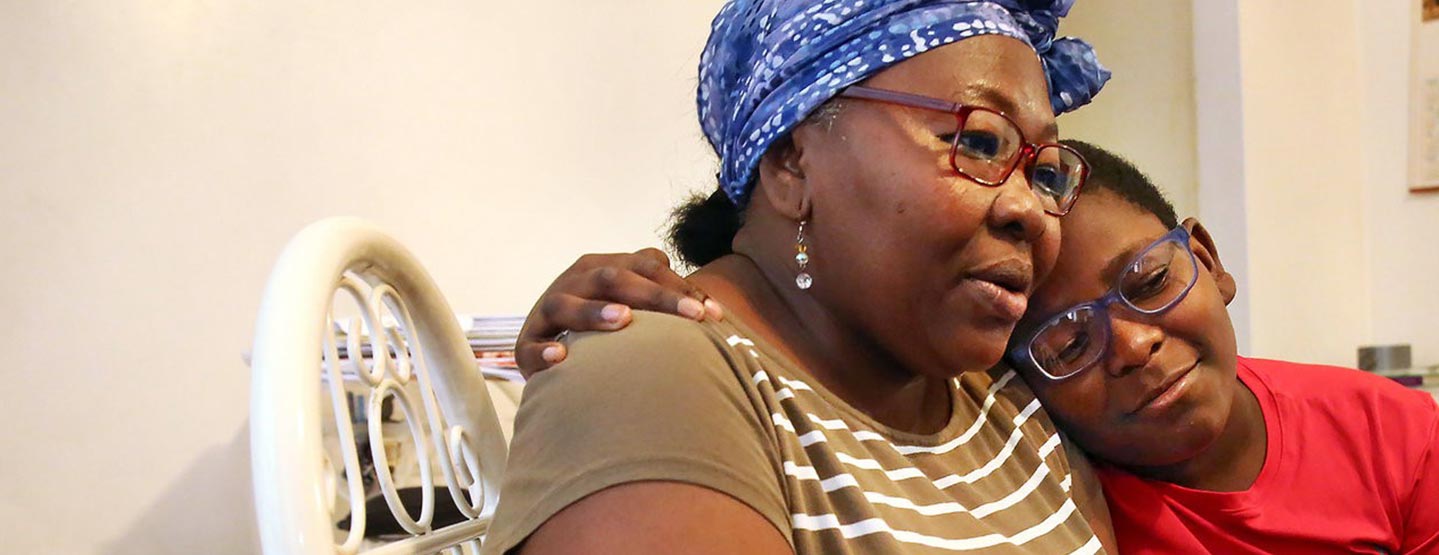Get Updates:
Thank you for signing up
Thank you! Please check your email to confirm your subscription!

Jashua Valentín woke up to his mother’s anguished cries. She usually helped him navigate his one-hour trip to elementary school in the Bronx, but on this day she sent Jashua, then 9, alone. The man who had been like a father to him was lying next to her, not moving.
Jashua’s mother, Herodidta Valentín Martínez, remembers that April morning in 2016 well. It was her partner’s first in a series of strokes that took away a little more of him each time.
Her partner, Ciriaco Bernandez, 55, spent the next month at Montefiore Family Care Center in the Bronx and had two more strokes, just days apart. The first stroke left him blind, mute and unable to recognize some visitors. In his last weeks, Mr. Bernandez could communicate “yes” with a hand squeeze. Every day, Jashua and his mother would make their way to the hospital after school.
Mr. Bernandez could still laugh, but he would not come home. He died that June.
Ms. Valentín, 50, described her partner as “a good man, the man of the house, always working.” They met in 2008, four years after Ms. Valentín immigrated from Limón Honduras.
There, she led a comfortable life, selling food and clothes in a shop. Speaking no English, she came to America hoping to provide a better life for Jashua’s three older siblings, who are now adults living in Texas. Jashua was born two years after Ms. Valentín moved to the United States, and for part of his early childhood he lived with his grandmother in Honduras, while his mother got settled in New York. When they reunited, he did not recognize her.
In the Bronx, Ms. Valentín met Mr. Bernandez, also from Honduras, through a mutual friend.
After that, “whenever I was going out to work I’d always see him,” she recalled in Spanish. “I’d take a different street and I’d always bump into him. He’d say, ‘Hi, how are you?’ And I’d say, ‘I’m fine.’ Wherever I’d go I’d see him. And that was that,” she added, laughing.
At the time, Mr. Bernandez was in good health, aside from high blood pressure. Ms. Valentín and Jashua were financially dependent on his steady job at a shipping and packaging company in Mount Vernon, N.Y., just north of the Bronx, to pay the bills and to meet the $1,070 monthly rent for their one-bedroom apartment in the Soundview section of the borough.
Ms. Valentín continued working as a home attendant throughout her partner’s decline, a job she has held for eight years. But her $11-an-hour wage, once used to supplement food, clothes and school supplies, could not cover even their rent. She tried to get additional work hours but was limited by Jashua’s school schedule and his long commute. She quickly fell behind on payments.
To save money, they used natural light and turned on the air-conditioning only at night, but their electric bill was $78 a month. By March 2017, Ms. Valentín owed $4,398 in rent arrears and faced eviction. She had gone to New York City’s Human Resources Administration for help, but her claim was denied at first. Then, Jashua’s bed broke. Unable to afford another one, his mother shared hers.
One day, waiting for Jashua outside school and overwhelmed by loss, Ms. Valentín broke down in tears. Jashua’s teacher saw her crying and referred her to Catholic Charities Archdiocese of New York, one of eight organizations supported by The New York Times Neediest Cases Fund.
Ms. Valentín came to Catholic Charities with her eviction notice in March, and the organization’s HomeBase staff represented her in housing court. That month, the Human Resources Administration forgave $3,205.60 of the debt, and Catholic Charities covered the remainder, allowing Ms. Valentín to keep the apartment. Catholic Charities then used $325 from the Neediest Cases Fund this summer to buy a single bed for Jashua.
Sitting across from a portrait of Mr. Bernandez — mustachioed, his arms by his side — Ms. Valentín’s voice trailed off as she remembered him. “He was like a father to my son,” she said, bowing her head and pinching her eyes as tears came.
Mr. Bernandez’s absence is still felt more than a year later. Jashua spends little time with his birth father, who also lives in the Bronx. He called Mr. Bernandez “Dad” or “Uncle,” and they played soccer together in the afternoons at a nearby park.
With the family dynamic greatly altered, Jashua clung to the normalcy of his school routine. “When I’d go to school, I’d forget about everything else,” he said.
Always a good student, Jashua lost himself in his studies, particularly his favorite subject, math. His grades gained him admission to Bronx Mathematics Preparatory School, where he started sixth grade in September. With funds from Catholic Charities, he was able to get a new red backpack, a blue lunch box and most of his school supplies. “I’m set for school,” Jashua said, smiling.
Looking to her own future, Ms. Valentín imagines greater independence, perhaps going to college or finding a better job. But all of that will wait, she said. For now, she will focus on her son. “He is my first priority,” she said.
Thank you! Please check your email to confirm your subscription!